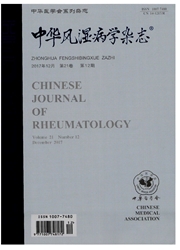

 中文摘要:
中文摘要:
目的应用酶联免疫吸附(ELISA)法检测患者血清中抗疏水配体结合蛋白(1ipocalin,LCN)多肽抗体,了解该抗体在干燥综合征(SS)诊断中的意义。方法以固相法合成的LCN蛋白多肽为包被抗原,应用ELISA法分别检测85例SS(包括72例原发性SS和13例继发性ss)、56例系统性红斑狼疮(SLE)、64例类风湿关节炎(RA)和96名正常人血清中抗LCN蛋白多肽抗体,并分析该抗体与SS的临床及实验室指标的关系。结果抗LCN蛋白多肽抗体在原发性ss、继发性ss的阳性率分别为62%和54%.而在SLE、RA和正常人分别为21%、25%和3%;抗LCN蛋白多肽抗体在SS诊断的敏感性为61.2%,特异性为85.6%,阳性预测值62.7%,阴性预测值84.9%;原发性SS与继发性ss患者抗LCN蛋白多肽抗体阳性率的差异无统计学意义(P〉0.05);SS患者抗LCN蛋白多肽抗体阳性率明显高于SLE、RA和正常人,差异有统计学意义(P〈0.01);与正常人相比,SLE和RA抗LCN蛋白多肽抗体阳性率亦明显升高,差异有统计学意义(P〈0.01);在SLE和RA之间差异无统计学意义(P〉0.05);抗LCN蛋白多肽抗体与SS患者临床表现、其他自身抗体无明显相关。结论@LCN蛋白可能是SS的一种自身抗原。②LCN蛋白多肽抗体对SS诊断具有参考价值。
 英文摘要:
英文摘要:
Objective To investigate the sensitivity and specificity of anti-lipocalin (LCN) polypeptide antibody in Sjogren's syndrome (SS) patients. Methods Synthesized LCN polypeptide was used as substrate for enzyme-linked immunosorbent assay (ELISA) to detect the antibody in sera of SS and other rheumatic diseases. Results Antibody against LCN polypeptide were detected in 62% of primary SS patients, 54% of secondary SS patients, 21% of SLE patients, 25% of RA patients and 3% of normal blood donors. Its specificity was 85.6% in SS patients with a positive predictive rate of 62.7% and negative predictive rate of 84.9%. It showed no significant difference between primary SS and secondary SS. The positive rate of LCN polypeptide antibody in primary and secondary SS (62.5% and 53.8%, respectively) were significantly higher than those in SLE, RA and blood donors (P〈0.01). The presence of LCN polypeptide antibody had no significant correlation with clinical manifestations or other laboratory parameters. Conclusions The lipocalin protein may be an autoantigen in SS patient. The anti- lipocalin polypeptide antibody is likely to be a candidate diag- nostic marker for SS.
 同期刊论文项目
同期刊论文项目
 同项目期刊论文
同项目期刊论文
 期刊信息
期刊信息
